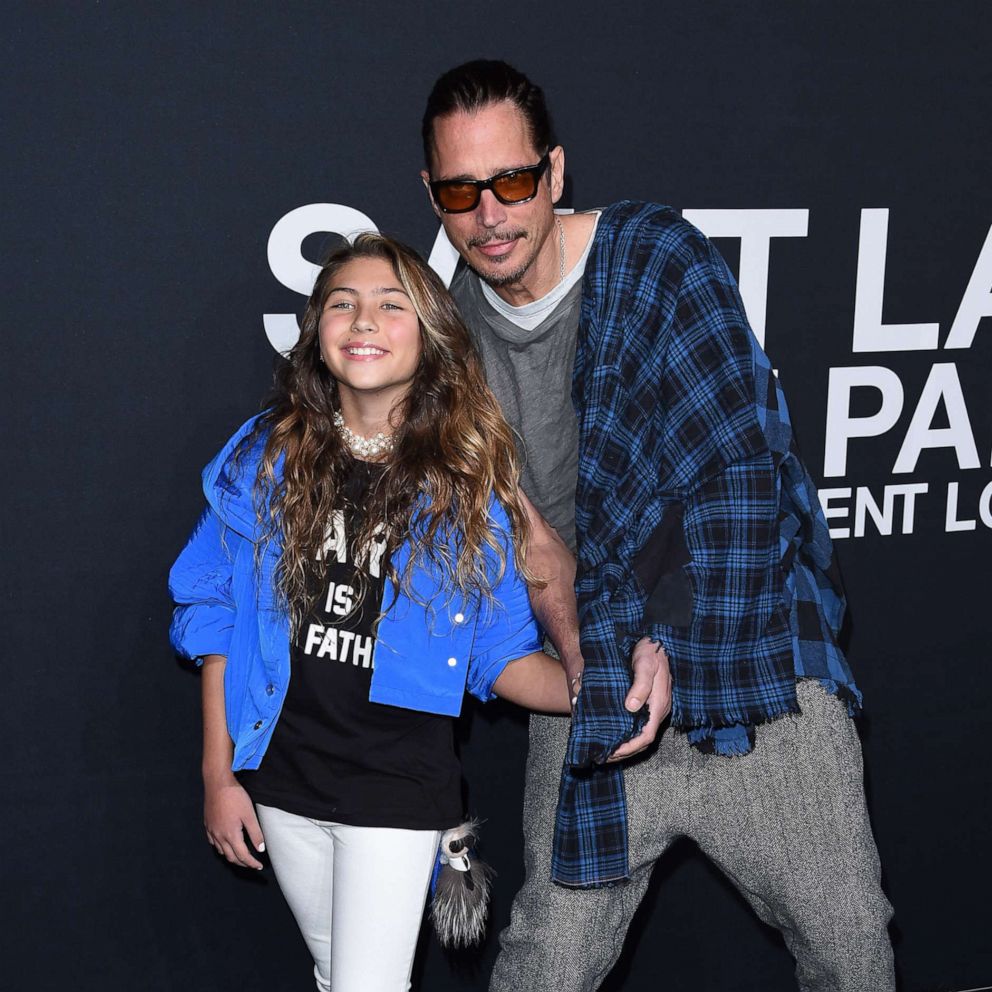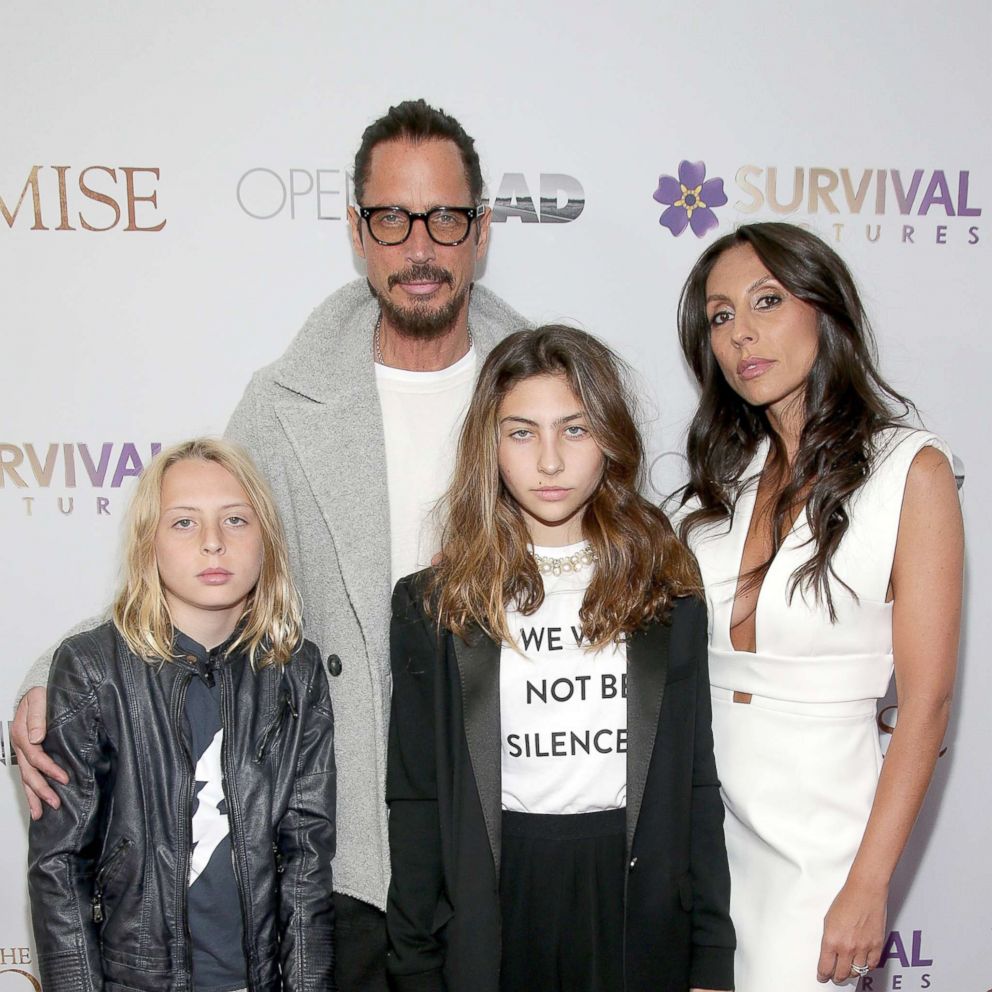Chris Cornell's daughter, Toni, opens up about her dad, addiction and how she's coping with his death
The 16-year-old seeks to change the conversation around addiction.
After Toni Cornell's father, Soundgarden and Audioslave frontman Chris Cornell, died in 2017, she took on a new mission: to educate the public about the realities of addiction.
Toni Cornell, who is now 16 years old, told "Good Morning America" that the circumstances surrounding her father's death inspired her to work to "change the conversation" around addiction and end the stigma.
"As a society, despite science proving otherwise, we still blame those struggling with this disease. Addiction is a mental health issue, not a character flaw and it so often left out of the conversation of mental health," she said. "That becomes dangerous because keeps people from sharing and even getting the help they need. It keeps this disease in the shadows even when it comes to doctors and medical professionals."
Saturday, Oct. 10, 2020 is World Mental Health Day, and in honor of the occasion, Toni Cornell, who has partnered with the Addiction Policy Forum to launch a national education initiative, "Stop the Stigma: Tackling the Stigma of Addiction through Education," wrote a personal letter about her father that she has shared with "Good Morning America." As she still struggles with her loss, Cornell, who wants to support others in similar situations, said: "People think three years makes it easier, but it didn't for me."
"It takes a heavy toll on your heart and mind so know that you aren't alone," she said. "And don't worry about time. Keep sharing and talking."
"If you know someone who is struggling, please use World Mental Health Day to reach out and let them know you care and that you can help them find treatment," she added.
Not a day goes by that I don't miss my dad. He was everything to me.
So many people were deeply affected by his life and his music. It is no exaggeration to say that he saved lives.
My dad never expected life to be perfect. His childhood was filled with ups and downs. He came from a family where both of his parents suffered with alcohol use disorder and he was often subjected to an abusive environment. At the age of 14 he started experimenting with different drugs, including PCP, which caused a panic disorder. He didn't share that with his parents when it happened and for the next two years he suffered from this alone and without support. He explained to us that up until that moment he felt he could do anything and that life was great and full of possibilities. Then all that changed.
He learned from his mistakes and shared those lessons with us. He shared how he overcame his own anxiety, but then also shared that alcohol had dragged him back into drugs. He explained how that led to depression and using other drugs because it took away the fear associated with it. He taught us the importance of understanding addiction.
Addiction education is so very important. Yet it is something that is not taught and not discussed enough.
I want to help change that.
I want to end the stigma of those battling addiction. The belief that it is always depression and anxiety that cause abuse is incorrect. This perception is perpetuated by stigma. My dad described addiction like an allergy, explaining that we too might have this allergy. It helped us to understand that addiction was genetic, and that it didn't mean there was something wrong with you.
My dad was a realist and he believed in tomorrow. And even though his music was dark at times, it was always full of hope. He taught us that a single moment in time does not define who you are and what you feel, nor does it take away your strength. We all have hard moments, he explained, "No one is happy all the time," and that we need to understand how anxiety affects everyone at some point in some way.
He tried to help others as well. Those who felt the stigma of addiction and were not able to understand that depression also comes when you "double up on depressants and your reality at the moment is not what's really going on for you."
This is why it is so sad that he lost his life when, in a tragic moment, drugs altered his reality. This tragic moment does not define who my father was nor should this tragedy be distorted to fit other people's stories. Speculation is irresponsible, it robs my father of who he was, and tarnishes the memories of those who truly knew him and loved him. Worse, it perpetuates a dangerous lie that can hurt others.
This much I know: My dad would never have stood for that. My dad's story is important and, as he would say, "We have to look to the past to navigate our future." We have to tell the story "because people forget." Depression and anxiety are issues that my dad dealt with, but those were not the reasons why he never returned from Detroit.
My family will never know true peace as there is nothing anyone can do to bring him back. But we will continue to honor him by sharing his message of hope and trying to spare others from suffering the same pain.
Our mission is to see our dad's legacy live on and to continue to positively impact lives. Education is paramount to not only understanding the disease, but also preventing it.
I believe that education needs to start in our communities and homes, but also in our schools. We need doctors and health care providers to be educated on addiction. We lose over 200 people a day to overdoses alone.
The science is there, now it's up to us as a society to catch up in order to save lives and understand this is a disease and not some moral flaw.
My family and I will continue to raise awareness and work towards changing laws and policy. If my dad was treated as an individual with a substance use disorder, he would never have been prescribed the medication he was given. Since my dad's death my mother has created a lot of open dialogue with medical experts in the field who sat with us and explained what happens to a person with a substance use disorder who is given a highly addictive drug. He was not prescribed this medication for anxiety, but for a physical injury.
My dad's death was completely preventable. We need to stop the stigma that does not allow us to see that this is a disease and a mental health disorder, not a moral flaw. The former perspective saves lives, the latter ends them.
I miss my dad every second of every day and I know he would not want his death to be in vain. I hope others can learn from our pain and experience, and I hope that we can stop the same thing from happening to every other family affected by this disease.
Toni stop-stigma.org
If you are struggling with thoughts of suicide or worried about a friend or loved one help is available. Call the National Suicide Prevention Lifeline at 1-800-273-8255 [TALK] for free confidential emotional support 24 hours a day 7 days a week. Even if it feels like it, you are not alone.







